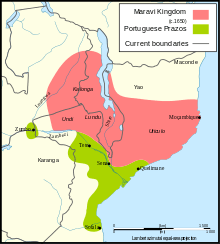Maravi
| Maravi |
|---|

Maravi was a kingdom which straddled the current borders of Malawi, Mozambique and Zambia, in the 16th century. The present-day name "Malawi" is said to derive from "Maravi" which itself means "fire flames".
At its greatest extent, the state included territory from the Tonga and Tumbuka peoples areas to the north to the Lower Shire in the south, and west to Luangwa and Zambezi river valleys. Maravi's rulers belonged to the Mwale matriclan and held the title Kalonga. They ruled from Manthimba, the secular/administrative capital, and were the driving force behind the state's establishment. Meanwhile, the patrilineal Banda clan, which traditionally provided healers, sages and metallurgists, took care of religious affairs from their capital Mankhamba near Nthakataka.
After contact with the Portuguese, trade intensified. It included such items as beads of the Khami type and Chinese porcelain imported via Portuguese intermediaries. In the 19th century, the state declined and the Maravi were frequently raided by their neighbors the Yao and captured for sale as slaves. David Livingstone visited Lake Nyasa in 1859, and Protestant missionaries soon followed.
"Maravi" is therefore a general name of the peoples of Malawi, Zambia, Mozambique and the eastern part of Zimbabwe. Chewa, which is also referred to as Nyanja, Chinyanja or Chichewa and is spoken in Malawi and Zambia and to some extent Mozambique, is the main language that emerged from this empire.
See also
- Rulers of Maravi